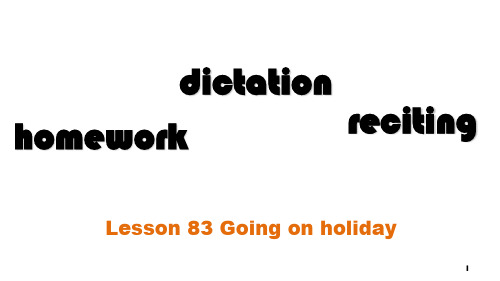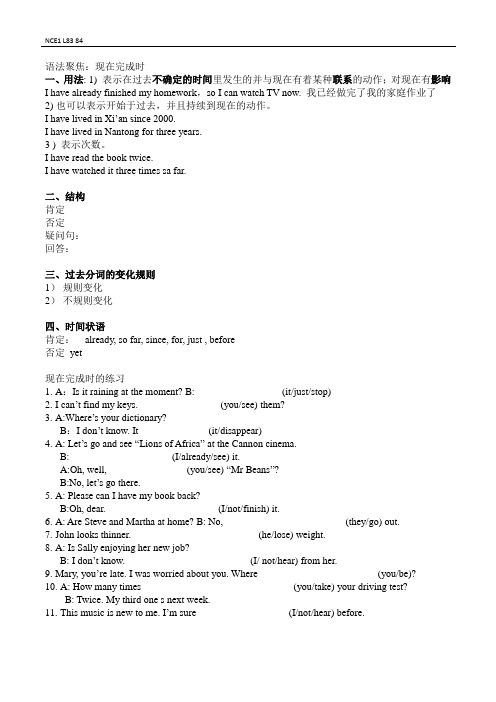新概念英语第一册83-84课课件
新概念英语第一册83-84课课件

Revision
• Grammar 句型 • 句型一 他正在洗澡。 He is having a bath. • 句型二 他在楼上。 He is upstairs. • 句型三 我和山姆一起吃午饭了。 Sam and I had lunch together today. • 句型四 你早饭/午饭/晚饭吃什么了? What did you have for .1. 自找麻烦 rock the boat • 2. 有麻烦 in hot water • 3. 祸从口出 put one's foot in one's mouth
7/15/2015
Revision
• • • • • • • •
• Words and Phrases 单词 • bath 洗澡 • restaurant 饭店,餐馆 • ready 准备好的 • nearly 几乎 • roast 烤的 • holiday 假日 • haircut 理发 • breakfast 早饭
• 萨拉丢掉工作和房子后变得穷困潦 倒。 • Sarah was down and out after losing her job and her apartment.
7/15/2015
• have a bone to pick with 有账要算 我有账跟你算.你还欠我十五美金没还呢 I have a bone to pick with you. You still owe(欠) me the fifteen dollars.
7/15/2015
Revision
我不要打 盹!!!我不 要打盹!!我 不要打 盹!。。。。
7/15/2015
课文导入 Lead In
新概念英语第一册Lessons83-84课件

• 每日一笑
Dragon born dragon , chicken born chicken , mouse’s son can make hole !
• 每日一笑
If you want money , I have no.
If you want life , I have one .
at 4 o’clock.
Would you like some ice-creams?
No, thanks. I’ve had an icecream. I had an ice-cream at four o’clock.
I’ve already had some/ one... I haven’t / She hasn’t had any ... Have you had any…?
2021/8/23
(2) n. 背包,行李包
Her pack is cute.
2021/8/23
★ suitcase [ˈsu:tkeɪs] n.手提箱
2021/8/23
★ already [ɔ:lˈredi] adv.已经
I have had lunch already. 我已经吃完午饭了。
2.have lunch with sb. 和某人一起吃午饭
We're having lunch with John today. 我们今天和约翰一起共进午餐。
Have you had…? 你已经...了吗?
Read the 2 stories:
<Ⅰ>
He had a piece of pizza at 5 o’clock. He is full.
I had at half past twelve. CAROL:Have a cup of coffee then. SAM:I've just had a cup, thank you. I had one after my lunch. TOM: Let's go into the living room, Carol.
新概念英语第一册83课件 (共42张PPT)

规则动词过去分词和过去式变法一样
1. + ed
clean --- cleaned
2. + d
arrive --- arrived
3. 辅音字母+y结尾的 把y 变i + ed empty --Fra bibliotek emptied
动词的过去分词的规则变
动词的过去化分词的规则变化,在动词后加ed,规则变化有
以下四种:
Lesson 83 Going on holiday
Where did you go on holiday? I went to the mountains.
Where did you go on holiday?
---I went to the mountains.
Where did you go on holiday? I went to Hainan.
乱七八糟的状态或局面
• messy 凌乱的,脏的
leave- left - left
mess
n.凌乱
pack
v. 打包
suitcase n.手提包
leave(left) v. 离开
already
adv. 已经
Listen to the tape and answer:
1)Did Sam have lunch/a cup of coffee? when?
pack:打包
unpack
New words
package n./ v. 包装
packet n.小盒, 小袋 a packet of 一包
camera
ticket
money
credit card
mess
优选教育新概念英语第一册Lesson83-84(共60张PPT)

2. 谈论过去发生的某事,但对现在造 成了影响
e.g. She has broken her arm, so she can’t play basketball. 她伤了她的胳膊, 所以她不能打篮球 了.
3. 过去开始的某事,现在还在继续.
e.g. He has lived in China for 20 years. 他已经在中国住了20年了. He has lived in China since 1993. 4. 刚刚发生的事情.
<Ⅱ> They had some ice-creams
at 4 o’clock.
Would you like some ice-creams?
No, thanks. I’ve had an ice-cream. I had an ice-cream at four o’clock.
I have had… 我已经吃过/喝过/从事了…
leave-left-left
lose-lost-lost
make-made-made
feel-felt-felt
spell-spelt-spelt
stand-stood-stood
2. 改变单词中间元音字母。
sit-sat-sat
win-won-won
hold-held-held
find-found-found
•
We're going to leave tomorrow.
•
Tom and I are going to have a holiday.
• SAM: Aren't you lucky!
• TOM: When are you going to have a holiday, Sam?
最新新概念英语第一册83-84课课件教学讲义PPT课件

• We’re going to leave tomorrow. • = We’re leaving tomorrow. • 当动词是leave, go, come, arrive等时,
可以用现在进行时表将来。
• I’m coming. • 他今天晚上就到 • He’s arriving tonight.
• 清理散乱的东西 • clear up the mess • He was such a mess that he did not
know what to do. • 他心乱得不知如何是好
★pack v. 包装,打包,装箱 ① v. 打包,装箱
• pack one’s suitcase 打包 • pack one’s suitcases 收拾行李。
• Let’s hold a meeting.
• untidy = messy • tidy-untidy • happy-unhappy • comfortable-uncomfortable • lucky-unlucky • like-unlike • sure-unsure • 单词前加“un”表示否定前缀
现在完成时VS一般过去时
时间最不偏私,给任何人都是二十 四小时;时间也最偏私,给任何人
都不二十四小时(赫胥黎)
勤奋的人是时间 的主人,懒惰的 人是时间的奴隶
清华学霸——马冬晗(姐姐)、马冬昕(妹妹 )
籍贯:中国,辽宁省 出生年月:1989.11 所在院校: 马冬晗(姐姐)清华大学,精仪系81班——
② v. 挤满,塞满 • 大厅里挤满了影迷。
• The movie fans packed the hall. • 公共汽车里挤满了人。
• The bus is packed with people.
新概念英语第一册83-84课课件教程文件

• with sb. 和某人一起。
1.琼斯先生和他的家人在一起。 2.你打算如何处理那花瓶? 3.吉米怎么了? 4.那位长着黄头发的女士是我们的英语老师。
already adv. already 用于肯定句
1.我已经吃过早饭了。 I have already had my breakfast.
2.yet用于否定句或疑问句,表示还没有。 我还没有吃早饭。 I have not had my breakfast yet. 你吃过早饭了吗? Have you had your breakfast yet ?
① v. 离开,出发 • 火车还有5分钟就开了。 • The train is going to leave in 5 minutes. • leave sp/ leave for sp • His uncle is in Beijing. He is going to
Beijing to meet him tomorrow.
Hi, Sam. We’re having lunch. Do you want to have lunch with us? No, thank you, Tom. I’ve already had lunch. I had lunch at half past twelve.
Have a cup of ctoeffaee then. I’ve just had twa ocucpups, thank you . I had twoonebaeftfeor re my lunch. Let’s go into thelidviinnging room, Carol. We can have our ctoeffaee there.
1.All roads lead to Rome. 条条大路通罗马。
Lesson83-84(课件)新概念英语第一册

A: Look at the picture. Have you had any peas
B: Yes, I have. I have already had some peas.
A: Look at the picture. Have you had any chicken
B: Yes, I have. I have already had some chicken.
We can have our coffee _th_e_r_e_. CAROL: _E_x_cu_s_e_ _th_e_ _m_e_s_s, Sam. This room’s _ve_r_y_ untidy. We’re packing
_o_ur_ _su_i_tc_a_s_e_s. We’re going to l_e_av_e_ tomorrow. _T_o_m_ _an_d_ _I_ are going to have a holiday. SAM: _A_r_en_’_t you lucky! TOM: When are you going to _ha_v_e_ _a _h_o_li_da_y_,Sam SAM: _I_ d_o_n_’t_ k_n_o_w_. I’ve already had my holiday _th_i_s _y_e_a_r. CAROL: Where did you go SAM: I _s_ta_y_e_d_ _a_t _h_o_m_e_!
7. 屋子很乱,请原谅 8. 我不知道
1. want to do sth. 2. with us 3. I have
= I’ve 4. at half past twelve 5. after lunch 6. Let’s
= Let us 7. excuse the mess 8. I don’t know
新概念英语第一册第83-84课ppt学习版.ppt

7
★pack v. 包装,打包,装箱 ① v. 打包,装箱
• pack one’s package 打包 • pack one’s suitcases 收拾行李。
② v. 挤满,塞满 • 大厅里挤满了影迷。
• The movie fans packed the hall. • 公共汽车里挤满了人。
精心整理
5
单词学习
• mess /mes/ n. 杂乱,凌乱 • pack/pæ k/ v.包装,打包,装箱 • suitcase/'sju:tkeis/
n. 手提箱 • leave/li:v/ v. 离开 • already/a:l'redi/
adv. 已经
精心整理
6
★mess n. 杂乱,凌乱 • 乱七八糟,请原谅。
then. • 6.We went to a
restaurant.
7.怎么了?出了什 • 7.What's the matter?
么事?
精心整理
4
Have a dication
• have(take) a bath • take a shower • give sb a bath • a bath of sunshine • bath roast nearly ready • dinner restaurant
• The bus is packed with people.
精心整理
8
★leave v. 离开 ① v. 离开,出发
• 火车还有5分钟就开了。
• The train is going to leave in 5 minutes. ② v. 舍弃;脱离
• John’s wife left him for another man. • 约翰的妻子舍他而去,投入另一个男子的怀抱。
新概念英语第一册83-84-86-85课课件

It’s old, but it’s very good.
3. What was the weather like in Paris in spring?
It was awful.
Read and act:
I have had some fruit. fruit
bananas
oranges
peaches
apples
vegetables
We have had some vegetables.
lettuce
cabbage
peas
beans
meat
He has had some meat.
beef
lamb
What has she done? She has aired the room.
What has she done? She has aired the room.
What has she done? She has aired the room.
What has she done? She has aired the room.
K: Yes, I have.
G: Wha2t's on?
K: ‘Paris in the Spring'.
G: Oh, I've alre3ady seen it. I sa4w it on television last year.
It's an old film, but it's very good.
Lesson 83 Going on holiday
New words
mess [mes]
新概念一NCE_Lesson83-84(共10页)

语法 Grammar in use
现在完成时
(1)在英语中,现在完成时主要用于以下两种情 况:或者表示在过去不确定的时间里发生的并与 现在有着某种联系的动作;或者表示开始于过去 并持续到现在的动作。
(2)现在完成时在汉语中常用“了”、“过”或 “已经”来表示。
பைடு நூலகம்
词汇学习 Word study
1. leave v. (1)离开,出发: The train is going to leave in 5 minutes. 火车将于5分钟后开出。 I'm going to leave Italy. 我准备离开意大利。 (2)舍弃;脱离: John's wife left him . 约翰的妻子舍他而去。 Alexander is leaving the company after 30 years' service. 亚历山大将在为公司服务了30年之后离开公司。
Hello, e in. Hi, Sam. We're having lunch. Do you want to have lunch with us? No, thank you. Tom. I've already had lunch. I had lunch at half past twelve. Have a cup of coffee then. I've just had a cup, thank you. I had one after my lunch. Let's go into the living room,Carol. We can have our coffee there.
词汇学习 Word study
1. leave v.
新概念第一册lesson83-84(课堂PPT)

--leave the door open, please. 3)忘带某物
--I left my umbrella on the bus. 4) n. 假期 --sick leave 病假
原形
过去式
过去分词
-make
made
made
-find
found
found
-spend
spent
spent
3)不规则变化(过去分词与过去式不一样)
原形
过去式
过去分词
-take
took
taken
-speak
spoke
spoken
-sing
sang
sung
4)不规则变化(过去分词,过去式,与动词原形一样)
11
leave 1) v. 离开
--It’s time for us to leave. --It’s time for sb. to do… 某人该做某事的时 间到了。
--leave a place for another place --离开….动身去….
--The plane leaves Guangzhou for
10
We are going to leave tomorrow. =We’re leaving tomorrow. 有些动词如:leave, arrive, go, come它们在表示最近的打算、计划 的时候,可以用现在进行时来代替 be going to的形式: 如:I’m coming. He’s arriving tonight.
新概念英语NCE1 L83 84 课件

语法聚焦:现在完成时一、用法: 1) 表示在过去不确定的时间里发生的并与现在有着某种联系的动作;对现在有影响I have already finished my homework,so I can watch TV now. 我已经做完了我的家庭作业了2)也可以表示开始于过去,并且持续到现在的动作。
I have lived in Xi’an since 2000.I have lived in Nantong for three years.3 ) 表示次数。
I have read the book twice.I have watched it three times sa far.二、结构肯定否定疑问句:回答:三、过去分词的变化规则1)规则变化2)不规则变化四、时间状语肯定:already, so far, since, for, just , before否定yet现在完成时的练习1.A:Is it raining at the moment? B: _________________(it/just/stop)2.I can’t find my keys. ________________(you/see) them?3.A:Where’s your dictionary?B:I don’t know. It _____________ (it/disappear)4.A: Let’s go and see “Lions of Africa” at the Cannon cinema.B: ____________________(I/already/see) it.A:Oh, well, _______________ (you/see) “Mr Beans”?B:No, let’s go there.5.A: Please can I have my book back?B:Oh, dear. ______________________(I/not/finish) it.6.A: Are Steve and Martha at home? B: No, ________________________(they/go) out.7.John looks thinner. _________________________(he/lose) weight.8.A: Is Sally enjoying her new job?B: I don’t know. ________________________ (I/ not/hear) from her.9.Mary, you’re late. I was worried about you. Where _______________________ (you/be)?10.A: How many times ______________________________(you/take) your driving test?B: Twice. My third one s next week.11.This music is new to me. I’m sure __________________(I/not/hear) before.ListeningCAROL: Hello, Sam.__________________.TOM: Hi, Sam.__________________.Do you want to have lunch with us?SAM: No, thank you. Tom.I've already had lunch._____________________________.CAROL: Have a cup of coffee then.SAM: __________________________, thank you.I had one after my lunch.TOM: Let's go into the living room,Carol.We can have our coffee there.CAROL: Excuse the mess, Sam._________________________________.We're packing our suitcases.We're going to leave tomorrow.______________________________________.SAM: Aren't you lucky!TOM: When are you going to have a holiday, Sam?SAM: I don't know._______________________________.CAROL: Where did you go?SAM: I stayed at home!KEY PHRASES1.2.3.4.5.6.7.8.9.10.11.12.13.14.15.16.17.18.19.20.21.22.23.24.25.26.。
- 1、下载文档前请自行甄别文档内容的完整性,平台不提供额外的编辑、内容补充、找答案等附加服务。
- 2、"仅部分预览"的文档,不可在线预览部分如存在完整性等问题,可反馈申请退款(可完整预览的文档不适用该条件!)。
- 3、如文档侵犯您的权益,请联系客服反馈,我们会尽快为您处理(人工客服工作时间:9:00-18:30)。
他想买一双舒适的鞋子。 He wants to buy a pair of comfortable shoes.
I’ve = I have You’ve = You have They’ve = They have He’s = He has She’s = She has We’ve = We have
1. I’ve already had lunch.
我已经吃过饭了。 2. I had lunch at half past twelve. 我在12点半吃的。 第一句话是现在完成时,现在完 成时表示过去发生的事情对现在 的影响,包含着“画外音”(我 不用再吃饭了)。
第二句话是一般过去时。如果仅 仅是表达在过去的什么时间做了 某事,特别是有具体的过去时间 状语的情况下,则用一般过去时。
3) 表示过去已经开始, 持续到现在, 也许还会继续下去的动作 或状态,常与包括现在在内的一段时间的状语连用。 She has learned English for 5 years. He has lived in Beijing since he was born .
Has he lived in Shenzhen for 4 years?
• 清理散乱的东西 • clear up the mess
★pack v. 包装,打包,装箱 ① v. 打包,装箱 • pack one’s suitcase 打包 • pack one’s suitcases 收拾行李。 ② v. 挤满,塞满 • 大厅里挤满了影迷。 • The movie fans packed the hall. • 公共汽车里挤满了人。 • The bus is packed with people.
uncomfortable = un- + comfortable
tidy-untidy happy-unhappy comfortable-uncomfortable lucky-unlucky like-unlike sure-unsure 单词前加“un”表示否定前缀
We’re going to leave tomorrow. = We’re leaving tomorrow. 当动词是leave, go, come, arrive等时,可以用现 在进行时表将来。 I’m coming. 他今天晚上就到 He’s arriving tonight.
Carol: Excuse the mess, Sam. This room’s very untidy. We’re packing our suitcases. We’re going to leave tomorrow. Tom and I are going to have a holiday.
Let’s do something. Let’s 后面接动词原形。 Let’s 包括对方,如 Let’s go! 我们一起走吧! 让我们做某事吧!
Let us 不包括对方,如 Mum, please let us play football. 妈妈,请允许我们踢足球。
go into living room
★leave v. 离开 ① v. 离开,出发 • 火车还有5分钟就开了。 • The train is going to leave in 5 minutes. ② v. 舍弃;脱离 • John’s wife left him for another man. • 约翰的妻子舍他而去,投入另一个男子的怀抱。 ③ v. 留给,遗留;委托 • ‘Leave it to me,’he said. • “这事交给我来办吧,”他说道。 • 不要把工作留到明天才做 • Don't leave your work till tomorrow.
Excuse the mess.
屋子很乱,请原谅。
房间里乱七八糟。
This room’s very untidy.
room’s = room is
untidy = un- + tidy
un- 是否定前缀,形容词前面加 un- 之后,该形容 词的意思变成原形容词的反义词,如 tidy (干净)变 成untidy(不干净)。这样的结构还有: unhappy = un- + happy
Sam:
现在完成时
have/ has +过去分词
现在完成时
past now 一般过去时
future
一般过去时表示的是纯 粹在过去发生的事情。
现在完成时表示的是在 过去某个时间开始并持续 到现在的动作/状态,或者发 生在过去却对现在造成的 影响。现在完成时在汉语
中常用“了”、“过”或 “已经”来表示。
常与for, since引导的时间短语或从句连用. for+ 时间段 since+时间点 , since+ 句子
比较since和for
since 用来说明动作起始时间— “自从……”
for用来说明动作延续时间长度— “长达……” I have lived here for more than twenty years. I have lived here since I was born. My aunt has worked in a company since 1949. I have not heard from my uncle for a long time. 注意:并非有for 作为时间状语的句子都用现在完成时 I worked here for more than twenty years. (我现在已不在这里工作。) I have worked here for many years. (现在我仍在这里工作。)
Sam:
No, thank you, Tom. I’ve already had lunch. I had lunch at half past twelve.
Do you want to have lunch with us?
want to do something (后接动词不定式 to) with somebody 和某人一起 我每天早上和Lucy一起上班 I go to work with Lucy every morning. 你也跟我们一道来吗? Will you come with us, too? 想要做某事
have在完成时中,是助动词,无实在意义 have还可做实义动词 吃早饭 have breakfast
抽根烟 have a cigarette 洗个澡 have a bath
喝杯橙汁 have a glass of orange juice
现在完成时的基本结构:
否定
have\ has + (not) + done (过去分词)
Lesson 83
Going on holiday
2013-1-16
Review
• • • • • • • He's upstairs. He's having a bath. I'm nearly ready. Have a cigarette. Have a glass of whisky then. We went to a restaurant. What's the matter?
Carol: Sam:
Have a cup of coffee then. I’ve just had a cup, thank you.
I had one after my lunch.
Tom:
Let’s go into the living room, Carol.
We can have our coffee there.
I’ve just had a cup, thank you.
我刚喝了一杯,谢谢。 just 表示“刚刚”,也是完成时的标志之 一。 这句话中,完成时的基本结构是: have + just + had 这句话的“画外音”是“我不用再喝了,谢 谢。”
Let’s go into the living room, Sam. 我们到客厅里去吧!
常与already(已经), yet(已经), just(刚刚),ever(曾经)等词连用.
already: 常用于肯定句中.
yet: 常用于否定句,疑问句尾.
• 在 以 上 两 种 用 法 中 常 跟 already,
not…yet, never, just, before, ever, recently等时间继续下去的状语。
现在完成时的用法
1) 表示到现在为止已经完成或刚刚完成的动作。
Now we have planted all the trees.
He has just come back.
They have built many buildings in this city.
2) 表示过去发生的动作,强调结果或对现在的影响。 Someone has broken the window. (窗户现在是坏的) I have already lost the key. (我现在没有钥匙) I haven’t read that book yet . (不了解书的内容) I have just cleaned my hands. (手是干净的)
Sam:
Aren’t you lucky!
Tom:
When are you going to have a holiday, Sam?
I don’t know. I’ve already had my holiday this year. Carol: Where did you go? Sam: I stayed at home!
进入 客厅
Let’s do sth 让我们…… 我们走 Let’s go. 我们开个会吧 Let’s hold a meeting.
